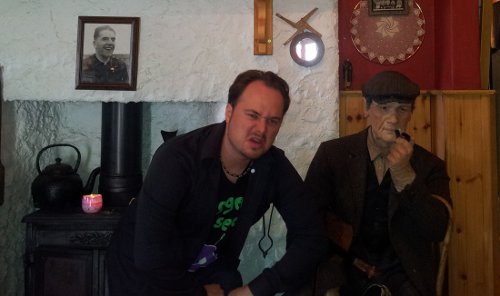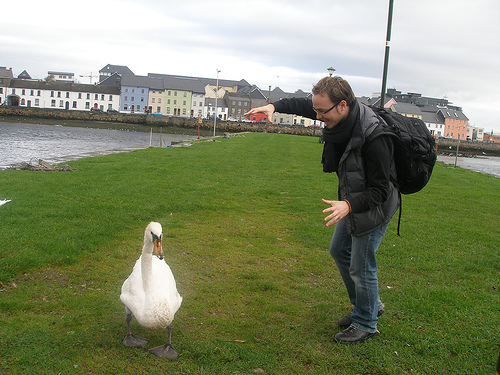Advanced Hiberno English: More on How to speak English like the Irish

I'm back in the Emerald Isle for the month (currently up in Donegal again, improving my Gaeilge before going back to Cavan for the Fleadh).
It's not just great to be speaking our first national language again, but also our second one; since I don't have to water down my English to be more understandable, as I do everywhere else. It's why you'll find me so quick into speaking the local language when I travel – I find speaking very literal international/business English to be fierce boring to be honest! Time to take a break from that in this article 🙂
One of the most popular articles on the site has been How to speak English like the Irish, where I give an introduction to the wonderful workings of “Hiberno English”.
Since I'm after showing yez how deadly our “canúint” is, and yez keep giving out about not understanding me, I'm gonna have to follow it up with a part 2, amn't I?
After some turns of phrase and important new vocabulary, I'll go on with today's theme of “slagging” (playful mocking), so there'll be cursing and plenty of taking the piss out of YOU dear reader. Us Irish do this very frequently, and no harm is meant by it. So if you get offended easily, kindly feck off now will ye!
God love ya if any plastic paddies can't follow the parts in italics, so I'll water them down for yez at the end of each section.
[Plastic paddy: Anyone who says “I'm Irish” but pronounces Ireland as I.R.land rather than OUR-lend . If you rely on the explanations to understand 90% or more of the words in italics or bullet points in this article, then NO, you're not Irish, not even “four sevenths” or whatever arsebackwards mathematics you can come up with. You're 100% American/Australian/Canadian etc. Having an Irish passport makes no difference -we practically give those away for free in the box of Cornflakes.
Fierce, is an intensifying adjective. Normally negative adjectives are used frequently like this to emphasise the intensity of a word, and can be positive or negative. More examples: She's awful gorgeous. You'll use up a serious amount of petrol to drive there!
Reminder from the previous article: deadly means good, to give out means to complain, and amn't I is like it's ugly cousin “aren't I”. yez is plural you (can also be yee or yous)
God love ya: An expression of pity, usually sarcastic. I'm not religious, but I'll still use many expressions like this. Another very common alternative is “Ye poor thing!”
Feck off: Way less offensive than “fuck”, so it's OK to say this in most company and you'll hear it on TV at all hours.
Canúint: “Dialect” in Irish/Gaeilge. Depending on the company and the part of the country, you'll hear some Irish words sprinkled into the conversation randomly. Check out this page for plenty of free resources to learn the Irish language!]
More different turns of phrase
I've given ye the basics, so I have. But there is much more to learn, don't you know!
C'mere 'till I tell ye!
The “present continuous” (be doing) in English was actually given to it by Celtic languages. You'll not see it used in most other Germanic languages (like German) at all at all, so you will see it used slightly more frequently in Irish, and this extends to even an entirely new tense, the Habitual Present; “Bíonn” in Irish. This is rendered as “do(es) be (verb)ing” in English. Much more common in the countryside nowadays than in cities though. As the name implies, it can only be used for habitual actions, not something just happening at the moment, which is the standard present continuous.
Some examples:
I do be working every day. It's him I do be thinking of. They do be talking on their mobiles a lot.
Another one which is less frequent in cities is reported speech, translating “arsa” from Irish. The word order as Gaeilge is “arsa mise” which, word-for-word is “says/said I”. When someone is keeping you in a story, these asides replace English word order of “I/he/she said”. It's also frequently used mid-sentence of the reported speech.
“Ah, now, you'll be grand on the drive – says I – sure, isn't the sun splittin' the stones today!”
And when in shops or otherwise requesting something from someone, even when all by yourself, it's important to say give us. This isn't necessarily the royal we, it's just convention. “Give us a packet of Taytos will ye?” and sounds a lot softer than “give me”.
[So I have, and Don't you know! are intensifiers added to the end of sentences.
C'mere 'till I tell ye! is a precursor to someone saying something interesting. It's only requesting your attention – you don't actually have to “come here” because your man is usually right beside you when he says it. (Your man is just a generic way of referring to someone male when you don't want to use their name, and your one is for girls)
The “till” (until) here means “so that I may”.
At all at all is a direct translation of ar chor ar bith. Each one means “at all”, but saying it twice really emphasises it. Since English doesn't have a useful alternative, we repeat it!
Ah, now – expresses dismay at something, in this example at someone giving out about something difficult when it isn't that bad.
When the sun is splittin' the stones it's very hot. This is good because it happens so rarely in Ireland generally, so we welcome it!]
Important new vocab when in Ireland
There are many more words that we use in Ireland that are worth knowing:
- There you go now (said when giving someone something)
- How are ye keepin'? How are ye? How's the form? (All alternatives for hello – once again in the Irish language, we tend to ask this question as a greeting (Cad é mar atá tú? in Ulster dialect, Cén chaoi a bhfuil tú? in Connemara or Conas atá tú? in Munster), since the translation of “hello”, Dia duit, is generally a bit too formal/religious)
- em (This hesitating word replaces um/uh used by most English speakers. I never hear the end of this when I first attempt to speak a new language and say “em” on camera whenever I'm trying to think of what to say. Give my head peace will yez!)
- “Bold” means naughty (usually of children), never brave.
- Not a bother (If you don't mind doing a task, and a good alternative to “you're welcome” after a thank you)
- A parer is how we say a “pencil sharpener”
- A yoyo is an alternative to “euro”. That costed me twenty yoyos!!
- “Horse box” can mean a stocky bloke, but my brother uses it to refer to basically anyone, shortening it down to “horse”. That's the way some of us say “hello” in our family now!
- Whisht!! Is our flavour of “shh!” – useful in pubs if someone is about to sing, or other such public venues to get everyone else to shut their gob (mouth)
- Well, the dead arose and appeared to many! This is used when you haven't seen someone for a while, out of surprise. Used in our house whenever someone stumbles down the stairs in their pyjamas at midday.
- Arse licker is a brown-noser.
- Cute has nothing to do with bunny rabbits or heart-throbs in boybands. It's clever in a sly way. If you are pushing your luck with it, it's common to hear “Don't get cute with me!”
- Dear means expensive.
Insults, and positive/negative words
As well as fierce and awful, mentioned above. There are plenty more words that you can use by themselves to express how fantastic something is. Something can be grand (good or OK), class/ deadly (excellent), mighty/powerful/savage (fantastic/great!) and a person can be a legend if they are really cool. No sonnets or stories of dragon-slaying need to have been written about them to earn the title.
If something is negative though, then it's cat, desperate, murder or brutal.
When you ask someone how they are, the answer is a more modest “not too bad”. It sounds bleak, but it's actually our way of saying “pretty good, actually!”. It's why America's overpositive “Awesome!!!!” annoys me so much.
One way that you can use individual curse words in Ireland is to alter the original one slightly. So ass is arse (although in this case arse is more vulgar. Unlike the Brits, we pronounce the ‘r' very clearly), and fuck is feck. Diphthongs on particular vowels help a lot, so shit becomes shite (rhymes with fight) and a particularly silly one is to avoid taking the lord's name in vain (perish the thought!) we say Jayzus instead of Jesus. Note that these are different words, they are not how the Irish pronounce fuck, shit and Jesus, which we use as the rest of the world would.
The longer you make the ay sound in Jaaaaaayzys, the more surprise at the situation there is, although this is usually quite a mild curse thanks to the fact that the word essentially means nothing and refers to absolutely no crucified fella who came from Nazareth!
When it's time to slag someone, then you can express your exasperation at how much of a slow eejitthey are by saying “Ah come on to fuck wilya!” Despite how it sounds, this is not an invitation for a ride (sexual intercourse. If you need transport anywhere ask for a LIFT unless you want a shlap!). Come on to fuck can be yelled at a bad sport player or anyone not living up to their potential.
If someone is quite the amadán, then you'd say that He doesn't know his arse from his elbow.
One much more colourful way of insulting someone, beyond individual words, would be actually cursing them. This is much more common in the Irish language, with use of the subjunctive (May he..), and some people may use it in English too, but almost never to someone's face. You're more likely to hear these from culchies than townies though.
Examples include:
- May the cat eat him, and may the devil eat the cat!
- May all of his possessions melt!
- May he suffer torment, anguish and bitter weeping
- May he and all of his offspring be awkward and unhandy
- May he meet the same end as the goats that chased the badger off the cliff
- May he itch but have no nails to scratch with
[Eejit is an idiot and Amadán is Irish for fool. A culchie is someone from the countryside, or even someone from anywhere but Dublin, who would technically also be a townie. Dubs really use the term out of incredible jealousy at how class the rest of the country is compared to the big smoke]
As before, this is just a small taste of some features of Irish English! Most things here are national, but some may be regional (savage, for example is much more frequently heard in Cork). If I've missed anything between this article and the previous one.









Social